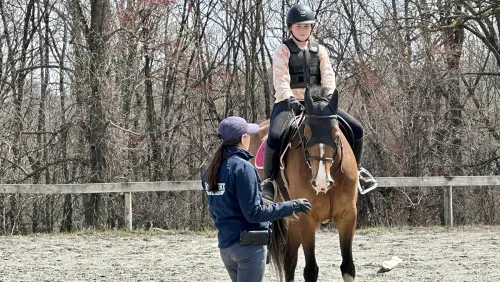Teaching good horsemanship and riding skills will always be the tenets that define the U.S. Pony Club, but that doesn’t mean this esteemed institution can’t change. Ideas were flying at the annual USPC Convention, held in Houston, Texas, from Jan. 27-31, and nothing was held sacred—from the name of the organization to the fact that it only promotes English disciplines—everything was up for discussion.
Some changes are certain for 2010. There will be three national championships for the first time. Members surveyed said they’d rather not travel more than 400-600 miles for the National Championships, so organizers hope holding Western Championships in Woodside, Calif., Midwest Championships in Kansas City, Mo., and Eastern Championships in Lexington, Va., will allow for more participation.
The Western and Midwest Championships may also offer non-championship open divisions to encourage even more members to attend. Only the Eastern Championships will offer polocrosse, although polocrosse committee member Dee Cook promised that every effort would be made to find horses for polocrosse players who want to attend championships but can’t bring a mount across the country.
“The qualifications for Championships are the same across the country,” said USPC Activity Services Director Wayne Quarles. “You can go to any or all of the Championships.”
Another big change in 2010 will occur in the club-level ratings—D-2 through C-2. District Commissioners will have the option of offering an alternative progression for ratings. Tests will be broken down into horse management, flatwork and jumping, and members can complete one portion of the test at a time.
This will give Pony Clubbers a lot more flexibility in how they progress through the ratings, although the standards won’t change at all. A horseless member could rate up through the horse management sections of the tests while remaining a D-1 rider. Or a member with a horse that doesn’t jump could rate up through the flatwork and then head into the national specialty ratings at the C-3 level.
ADVERTISEMENT
However, the flexibility isn’t limitless. Pony Clubbers must complete the horse management portion of the test for any given level before attempting the flatwork, and they must pass the flatwork before going on to the jumping.
“A new member could progress all the way to H without having any riding skills demonstrated,” said Vice President of Instruction Lorelei Coplen. “It will be extraordinarily helpful for members who are between horses or are in college.”
These new separated ratings might also provide a way to include the western disciplines in Pony Club, although that change faces plenty of opposition and is a long way from implementation.
The Pony Club manuals will be under review in 2010, as will a new system of judging at rallies—the Earned Points System. Currently, Pony Clubbers lose horse management points for every deviation from the standard, but there is no way to reward excellence that goes above and beyond. In the new system, members would earn points across a range—similar to how dressage tests are scored—so a high score would be desirable rather than a low one. Rally organizers can volunteer to test this new system throughout the year.
The new horse management handbook is out, so be sure to download one from www.ponyclub.org before rally season starts.
The question of how to retain and expand membership came up throughout the convention. Board of Governors member Claire Harmon discussed many ways Pony Club will promote itself at the Alltech FEI World Equestrian Games this fall in Kentucky. These include:
ADVERTISEMENT
- A world map at the USPC booth where members can locate their Pony Clubs around the world
- Photos of Olympians who have been in Pony Club at the booth
- A full-page advertisement in the WEG program
- Autograph signings with famous alumni
- Prize giveaways
- Pony Club members will present ribbons and medals at the awards ceremonies for all the disciplines
The National Youth Board, which was formed last year, proved that even the name Pony Club isn’t set in stone when they actively debated whether the organization was best represented by a name that invokes, “little girls and My Little Pony,” according to NYB member Mark Greene.
“If the name was U.S. Youth Equestrian Organization, then you wouldn’t have to beat around the bush and avoid the name. It would cost money and take time, but if it took 10 years, then we’d be better off for the next 100 years,” he opined.
Although a name change will require a lot more research and discussion, these enthusiastic board members were adamant that it’s the mission of Pony Club—to promote horsemanship, leadership and character-building—that must be maintained, not the trappings.














